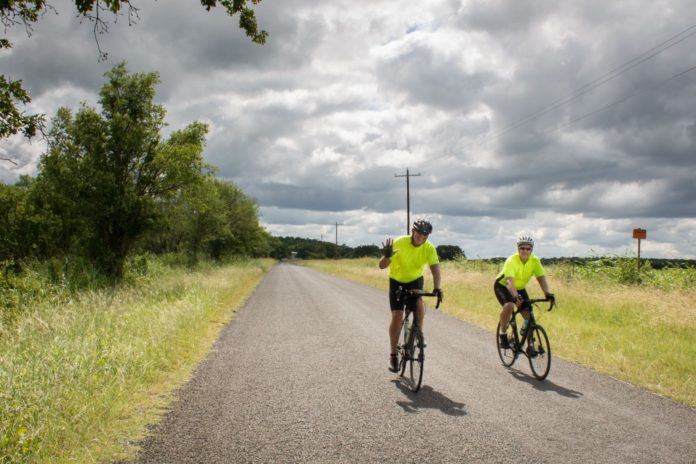Light the Trail
Lewis and Clark Trail
Sept. 3-Nov. 11
LightTheTrailRide.org
Local executives Tom Harris and Isaac Manning will be riding their bikes 3,700 miles for an average of 60 to 80 miles a day for 70 days as part of an initiative by the Jordan Elizabeth Harris Foundation called Light the Trail. It is a bike ride over the Lewis and Clark Trail, in reverse, to raise awareness of the importance of depression and suicide prevention.
They will start the ride on Sept. 3 in Fort Clatsop, Oregon, and will ride into Washington, D.C. on Veterans Day, Nov. 11. Harris, 63, the president of Alliance Air/Aviation Services Hillwood Properties, and Manning, 57, the president and CEO of Trinity Works Fort Worth, will be joined by a support team including their wives and Program Director Dyar Bentz.
Harris said that they are hoping to raise $1 million, with 15 percent going to support the ride and the rest going to the foundation’s depression and suicide prevention efforts. Their journey can be followed on Facebook (@lightthetrailride) and on Instagram (@lightthetrail). There is also a website (lightthetrailride.org) with a donation page.
The Fort Worth Business Press talked with Manning and Harris ahead of their ride.
What inspired the bike ride?
MANNING: It’s a combination of two factors. The first is after having read Undaunted Courage by Stephen Ambrose, the story of Lewis and Clark going out and back. [Undaunted Courage: Meriwether Lewis, Thomas Jefferson, and the Opening of the American West recounts the 8,000-mile journey of exploration from May 1804 to September 1806 from near St. Louis to the Pacific Ocean and back.] It’s probably one of the greatest business leadership lessons that I’ve ever read because these guys were able to get 33 guys out and back and lose one person to appendicitis. It was a remarkable story of an adventure of remarkable proportion for the time that they were doing it. I was inspired by that.
And then the other part of it is with Jordan Harris’ death; her dad and I have been trying to figure out some way to honor her, and the thing that people don’t realize about Meriweather Lewis is that he was the most accomplished guy of his generation and he comes back and he’s battling depression the entire way out and back, falls under depression and ultimately dies of suicide.
There was a direct tie-in for that so the bike ride becomes a story about all the people that are suffering from depression, and regardless of how much they’ve accomplished in life everyone is subject to depression and many people are succumbing to suicide, particularly in the veteran community.
What inspired you to say yes to the ride?
HARRIS: When you lose your daughter that’s motivation enough. Jordan was a rock star. She was 22, valedictorian of her high school class, an athlete, a beautiful young woman. Her mission was all about changing the world, University of Michigan student, never sick a day in her life, until she was a senior in college and then started going through severe depression and never really recovered.
We lost her about five and a half years ago, March of 2012. Tragic and something I wouldn’t wish on my worst enemy if I had any. … When you go through that kind of experience there’s … all kinds of different ways … to react to that. You either fold up and go hide behind a rock or you try to do something to make a difference. My wife, Ellen, and I decided that by creating this foundation we might be able to help others who struggled after recognizing the tremendous need that existed.
What do you want to accomplish with the ride?
HARRIS: We want to let people know that the conversation associated with depression and suicide prevention is a conversation that is important to have and to continue to have in a very open fashion and not feel bad about the fact that we’re having that conversation and don’t necessarily feel like you’ve got to hide it from others. Particularly when it’s someone in your family or someone you’re close to that’s struggling. … I can remember when Jordan was sick and it was kind of, “Oh my gosh, we don’t need to share this with anybody.” And as much as we went out and got the docs and got medicine for all those things, it was something that was very private. … We want to be able to raise the level of importance of treating mental illness in this country by the way of a grassroots effort across the country. … And be able to let them know what we’re doing, but more importantly hear their story.
How did you train?
HARRIS: Generally speaking, you’ve got to watch what you eat, especially when you are as old as I am, so diet is important. We’ve got gradual build of miles over time up until now. We’ve had two long weekend rides already where we’ve gone Friday, Saturday and Sunday. … It’s generally a workout plan that incorporates heavier miles as you go, and as you’re leading up to the ride with some other things like swimming and weight lifting and those kinds of things to support what you’re doing.
Anything else?
MANNING: I’ve been in Fort Worth for 28 years this year and the support of everybody in Fort Worth has just been so overwhelming. Tom and I are both so appreciative and we’re incredibly grateful for Mike Berry and the guys at Alliance and Ross Perot Jr. for supporting us on this mission. And understanding the importance of it and just the level of community support and friend support that we’ve had has just been amazing, and we’re extremely grateful.






